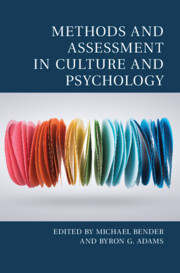Book contents
- Methods and Assessment in Culture and Psychology
- Culture and Psychology
- Methods and Assessment in Culture and Psychology
- Copyright page
- Dedication
- Additional material
- Contents
- Figures
- Tables
- Contributors
- Foreword
- 1 Introduction to Methods and Assessment in Culture and Psychology
- Part 1 Acculturation and Identity
- 2 Three Generations of Psychological Acculturation Research: Theoretical Advancements and Methodological Challenges
- 3 A Road Map for Integrating Religiosity to Acculturation Research
- 4 Identity in Remote Acculturation: Developments in Research and Methodology
- 5 Acculturation and Diversity Management at Work: The Case of Multicultural South Africa
- Part 2 Individual Differences across Cultures
- Part 3 Culture and Assessment
- Index
- References
4 - Identity in Remote Acculturation: Developments in Research and Methodology
from Part 1 - Acculturation and Identity
Published online by Cambridge University Press: 21 January 2021
- Methods and Assessment in Culture and Psychology
- Culture and Psychology
- Methods and Assessment in Culture and Psychology
- Copyright page
- Dedication
- Additional material
- Contents
- Figures
- Tables
- Contributors
- Foreword
- 1 Introduction to Methods and Assessment in Culture and Psychology
- Part 1 Acculturation and Identity
- 2 Three Generations of Psychological Acculturation Research: Theoretical Advancements and Methodological Challenges
- 3 A Road Map for Integrating Religiosity to Acculturation Research
- 4 Identity in Remote Acculturation: Developments in Research and Methodology
- 5 Acculturation and Diversity Management at Work: The Case of Multicultural South Africa
- Part 2 Individual Differences across Cultures
- Part 3 Culture and Assessment
- Index
- References
Summary
Remote acculturation advocates for acculturative processes people may be engaged in without making first-hand, continuous contact with others from different cultural groups. It creates new opportunities for people to negotiate their identities. Due to globalization and the related increase in multiculturalism in societies, the cultural context in which people find themselves provides different options about which identity-related aspects they may consider important when defining themselves. In this chapter, we examine tridimensional identity (accounting for personal, relational, social identities) in relation to remote acculturation. We start by evaluating the long-standing relationship between identity and acculturation. We then define remote acculturation as an extension of traditional (proximal) acculturation, and review quantitative and qualitative research methodologies to examine the role of identity within remote acculturative studies. The chapter closes with recommendations to enhance our understanding of the relationship between identity and remote acculturation.
Keywords
- Type
- Chapter
- Information
- Methods and Assessment in Culture and Psychology , pp. 62 - 77Publisher: Cambridge University PressPrint publication year: 2021

